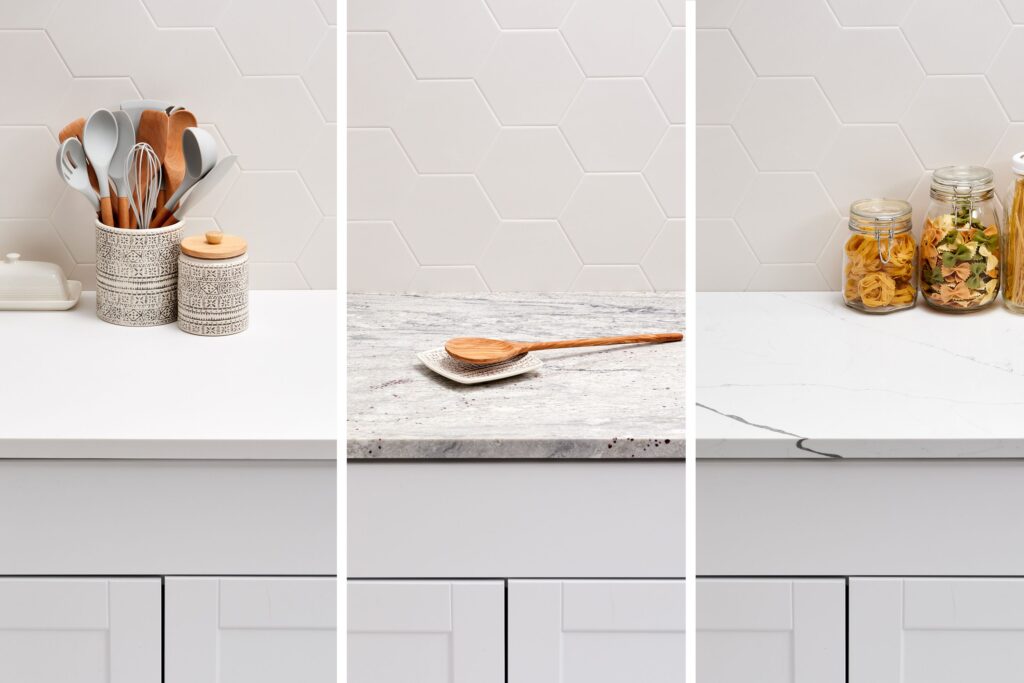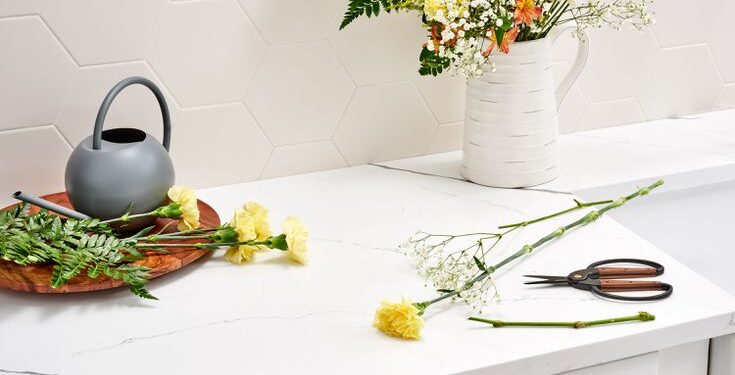Nowadays, there is a huge competition among countertops.
That being said, there has been an on-going battle between granite composite vs quartz countertops for the top spot in the industry. This is one of the most tricky choices for homeowners because both materials have significant benefits.
Also, both countertop materials are extremely durable and available in different colours, which makes the competition more intense.
So, choosing one of them may become a huge challenge!
This detailed granite composite vs quartz countertops comparison guide will help homeowners make an informed decision.
First, let’s dig deeper into what are quartz and granite countertops:
Quartz countertops
Quartz countertops are manufactured engineered stone surfaces composed of around 90% powdered quartz, a naturally hard material, plus 8–10% resins, polymers, and pigments. As a result, a surface resembling granite is created.
Many households are utilizing quartz as their countertop materials with cabinets and backsplashes.
To know more about kitchen designs, read Caesarstone guide.
Granite countertops
After diamonds, granite is the second-hardest natural substance. It lasts a very long time, is simple to maintain, and has an exquisite appearance. The sharpest knives won’t even leave scratches on their surface because of the unbelievable scratch-proof property.
Feldspar and mica are the minerals that produce granite light grey and black hues, respectively. Large blocks of granite are mined from quarries using specialized milling tools and cut into smaller, usable slabs.
Granite composite vs quartz countertops
Now, let’s look at the difference: granite vs composite countertops. It will help homeowners to choose the one that suits their requirements:
Composition
Granite is a natural stone that is extracted right from the mine. These unfinished stones are then formed into countertops by being cut into thin slabs, polished, and finished.
Alternatively, quartz countertops are man-made material with between 92 and 94 percent crushed quartz. For colouration, more minerals and pigments are utilized, and resin is used to glue everything together.
Appearance
Granite comes in a few colours, ranging from soft earth tones to blues, roses and vibrant greens. Homeowners might have to search for the ideal piece that suits the colour scheme of the area, given the variety of possibilities available.
On the other hand, quartz is manufactured with additional pigments, giving it a wider range of colours and more consistent hues. It’s best for homeowners looking for a perfect colour to match the overall kitchen theme.
Maintenance
Daily cleaning with soap and water or a mild home cleaner is recommended for granite countertops. Also, it is important to conduct research in advance to prevent stains. Consider getting countertops sealed once a year to protect the investment.

Because of the solid surface, the countertops don’t need to be resealed. They are scratch and stain resistant. Also, the only upkeep required for quartz countertops is to clean any spills with soap and water or a common household cleaner, similar to granite.
Durability
Granite is a hard substance that can withstand heat and numerous other kitchen conditions. However, because of its porous nature, spilt liquids may cause discolouration if left on the surface. Also, a high impact hit on the counter may cause serious damage.
Alternatively, quartz is more durable and harder than granite. Because quartz isn’t porous like granite, keeping the countertops completely bacteria-free is simple. Since excessive heat can harm quartz, it’s important to use trivets at all times when placing cooking pans on the surface.
Cost
The typical cost to buy granite and have it installed can range from $2,000 to $4,500. Although homeowners can save money by buying the materials in bulk and doing some preliminary work, a professional should be hired to fabricate and install the countertops.
While it will cost, on average, between $3,000 and $7,500 to install quartz countertops in a kitchen, depending on the quartz’s type and the style of edging. Because engineered quartz is heavier than conventional stone surfaces, homeowners can do some preliminary work themselves to save money. Still, a professional installer must ensure the area is structurally sound before installing engineered quartz.
Origin
It’s a fact that choices of homeowners are greatly influenced by origin, which determines many features of stone. Many characteristics of the substance can be inferred just from its origin. As already said, quartz is a man-made substance, but granite is a natural substance. This helps to explain why quartz is more refined, given that it is produced synthetically.
Homeowners don’t need to worry too much about maintaining this material because the impurities are taken care of. Additionally, one can rely on this stone to be offered in a variety of hues and designs to suit their tastes.
Alternatively, granite tends to be more organic, allowing it to appreciate its distinctive design. As a result of its natural occurrence, it is more stable than quartz. But keep in mind that it frequently contains contaminants. To maintain the stone’s original beauty, homeowners will also need to invest in care.
Porosity
When choosing a stone for the sink, porosity is another crucial quality to consider. It affects stain susceptibility, durability, and other factors that will determine the lifespan of the sink.
Quartz is less porous than granite. However, greater porosity does not always equate to higher quality. This is due to the fact that a material’s porosity determines how quickly it absorbs liquids and food particles. Dropped food and drinks can stain the material, creating a breeding environment for bacteria and viruses.
To increase the stone’s lifespan, extensive maintenance will be required, such as sealing it every one to two years. Quartz is often a non-porous material, making it less likely to stain, which makes it a perfect material for the busy kitchens.
Everything you need to know about composite granite vs quartz countertops — Final thoughts
All in all, quartz countertops are the best option if one is seeking something carefree, colourful, and less fragile. They are attractive, stain-resistant, and durable counters.
Granite would be the most obvious material choice for those who prefer natural materials. Its distinctiveness and natural beauty cannot be disregarded. The endurance and durability of such counters can be ensured by exercising extra care and caution.






